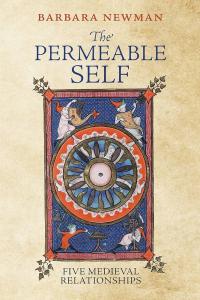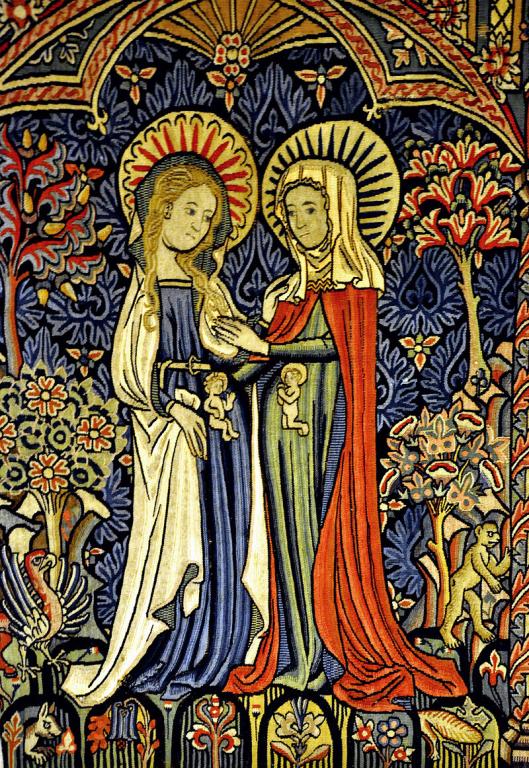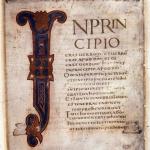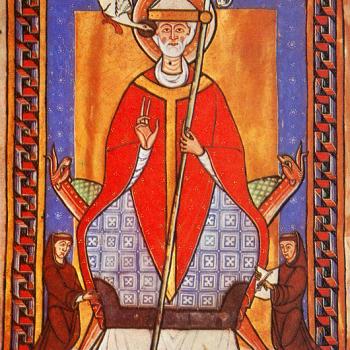For my post this month, I wanted to revisit my Christmas post from last December. I’m still compelled by the power of this metaphor and the theologians who utilized it to draw closer to the incarnate Christ. I hope it blesses you as well! – JR
In Every Heart There Is a Womb: Mary’s Pregnancy and Ours
As I’ve been thinking about what to bring to my column this month in preparation for the birth of Christ, two things have returned to the forefront of my mind again and again. First, I can’t get over a chapter I read by Barbara Newman on the metaphors of pregnancy and childbirth in her book, The Permeable Self: Five Medieval Relationships. (By the way, I read anything Barbara Newman writes when I can find time. She’s brilliant.) I’m particularly interested in the discourse around the interpretation of the Virgin Mary’s pregnancy and its afterlives in medieval Christianity, as you’ll see below. Second, after reading her chapter, I can’t stop myself from punning a Billy Joel song for the title of my post. So you’re welcome, or my apologies, depending on your feelings about puns and/or Billy Joel.
When approaching the subject of Mary, one can easily become very overwhelmed with the mountain of source material. Where to start? In my case, I’m curious about how Mary’s motherhood, and specifically her pregnancy, appears as a spiritual example for Christians in various spaces. I was surprised to find frequent references to Mary’s pregnancy as something to be emulated. As it turns out, from very early on, Christians venerated Mary, the mother of Jesus, as an allegorical representation of the metaphysical transformation that all Christians underwent. Mary’s miraculous impregnation danced along the folds of the Christian imagination, inspiring new ways of conceptualizing belief and conversion. Christ’s nativity presented colorful imagery to tie together the world of the Bible, the corporeal and gendered nature of human existence, and the transcendental encounter between God and the individual. Mary’s bodily experience proclaimed the inexpressible mystery of conversion—as ineffable as the incarnation of God in human flesh—and its visceral and corporeal reality, as palpable as the experience of pregnancy and childbirth.
Let Every Heart Prepare Him Room
Christian pastors often thought of Mary’s miraculous pregnancy as analogous to how the Word of God was implanted in the human soul through preaching and virtuous action. Augustine once, when preaching on Christmas Day, ended his sermon encouraging his hearers to “perform” the miracle of Mary’s conception “in the depths of [the] soul.” “When you believe in the heart unto justice,” Augustine says, “you conceive Christ; and when with the lips you confess unto salvation, you give birth to Christ.”
Barbara Newman writes of the frequency and flexibility with which Christian authors used the allegory of Mary’s pregnancy. She notes that transposing pregnancy to the realm of ideas gave “Mary’s uniquely fruitful virginity a universal application, not setting her on a lonely pedestal but holding her up as supremely imitable.” Of course, as the Church’s theological development bent toward the special quality of monasticism, the imitation of Mary, and with it the possibility of undertaking a spiritual pregnancy, gradually became, ironically, restricted to a class for which bodily pregnancy was a physical impossibility—celibate priests and holy virgins. The priority of the incorporeal reframed the importance of Mary for many medieval religious. Her exemplary submission to God, epitomized in the conversation between Mary and Gabriel, and her virginity, a symbol of pure spirit, became signposts for those who sought to form Christ in their own lives. Ephraim the Syrian, for instance, spoke about two ways that Mary bore Christ. “The Holy One dwelt bodily in the womb,” Ephraim writes, “and he dwelt spiritually in the mind.” For Ephraim, Mary’s physical chastity was necessary, mainly because it was evidence of an inward purity that allowed her to be a spiritual vessel of the divine. The duality of Mary’s Christ bearing seems to have been a common trope. The German mystic Meister Eckhart, for instance, echoes the two conceptions and “pregnancies” in Mary. She was able to bear Christ physically because she had first “borne God spiritually.” This was instructive for Eckhart, who wrote that “It is more worth to God to be born spiritually of the individual virgin or good soul, than that he was physically born of Mary.”
Bearing Christ, Body and Soul
But late medieval female mystics also had Marian experiences that were no less corporeal for their being spiritual in origin. These women, also captured by the nativity and compelled to imitate Mary, shared not only the Queen of Heaven’s inner character but her bodily sensations as well. Newman points to various examples of psychosomatic connections narrated by writers of women’s hagiographies. Newman narrates the story of Lukardis of Oberweimar, a thirteenth-century Cistercian nun. According to the author of her vita, Lukardis was prone to ecstatic experiences. Here it is worth quoting Newman at length: “One Christmas, as Lukardis wondered whether the Virgin Mary had really escaped the discomforts of pregnancy and the pain of childbirth, her body answered the question for her: ‘As she turned these things over in her mind, in an instant she did not sense but saw her belly gradually swelling like a pregnant woman’s, as it were, then suddenly diminishing…from this joyful experience she knew that, just as she had felt no pain or heaviness in her vision, the Blessed Virgin must have had ‘incomparably less.’”
Perhaps the most famous of these accounts is the Christmas eve experience of Birgitta of Sweden. In her book of revelations, she recounts in physical terms a spiritual pregnancy with Christ:
On Christmas night…she felt a wonderful sensible movement in her heart like that of a living child turning and turning around…at high mass on the same day, God’s Mother appeared to the bride [i.e., Birgitta] and said: ‘Daughter, you are marveling at the movement you feel in your heart. Be assured that it is no illusion but shows a similarity to my own delight and to the mercy done to me.

Mary went on to tell Birgitta that, just as she felt “something wonderful and alive in me” as soon as she received word from Gabriel, so too Birgitta could give thanks that “this movement that you feel is a sign of the coming of my Son into your heart.” According to Newman, this was an utterly transformative experience, one that set the course of Birgitta’s life by making her a “mother” of Christ through bringing him into the world through public ministry.
The holy mother’s dual conception carried into the Reformation, as did the metaphor of belief as impregnation. Martin Luther appealed to Meister Eckhart’s primacy of the spiritual in his debates with Johannes Oecolampadius, Ulrich Zwingli and others over the right interpretation of the supper. Luther wrote that it was the spiritual reality of Christ’s presence that gave significance to the physical object of Christ’s flesh and blood in the supper. They were joined together, but Mary’s spiritual conception was the conduit for her physical pregnancy:
When the Virgin Mary conceived and bore Christ, Christ was certainly a real, physical, visible man and not only a spiritual being; yet she conceived and bore him spiritually also. How? In this way: She believed the word of the angel that she would conceive in her womb and bear a son. With the same belief in the angel’s word she conceived and bore Christ spiritually in her heart at the same time as she conceived and bore him physically in her womb. If she had not conceived Christ spiritually in her heart, she would never have conceived him physically…Since she grasped the word and through faith became pregnant with it in her heart, she also become physically pregnant with that which the word in her heart said to her.
Luther went on to state that Christ’s incarnation would have been worthless to Mary had he not first been made spiritually manifest in her heart through belief in the words of God. Elsewhere, Luther allegorized Mary as the believing individuals who comprised the Church. He was preaching on the Epiphany, the appearance of the Magi, Matthew 2:1-12. He began his sermon by preaching that “the natural birth of Christ in every way signifies his spiritual birth—his birth in us and our in him…For this birth two things are necessary, God’s word and faith, and in these two the spiritual birth of Christ is fulfilled.” On verse 11, “They went into the house and found the child with Mary his mother and fell down and worshipped him,” Luther preached, the house was the church, because only in the church “are they to be found who are pregnant and fruitful by the Holy Spirit, give Christian birth, and lead a Christian life.”
For Luther, the nativity event was itself pregnant with meaning, pulsing with associations and images that point to new life. Christians become Mary as we give birth to the Word in faith. We also become Christ himself, since the incarnation marks the exchange of our birth for his. By faith, Luther taught, Christians were given not just knowledge of Christ, but they were given Christ himself to put on—so much so that by faith “you sit assuredly in the Virgin Mary’s lap and are her dear child.” Finally, every Christian becomes the desperate audience of the Christ child. For the angel “does not simply say: ‘Christ is born,’ but: ‘for you he is born.’”
The Fruit of Faith
There is still much to explore on the topic, and I plan to do so. So in lieu of a nicely wrapped conclusion, may I offer some devotional application?
As you consider the fruit of Mary’s labor and the blessing of Christ’s appearance this season, may you take Christ as a gift, a miraculous coming of God, not only into the world, but into your very soul. May you join our mother, Mary, in seeing Christ’s coming as an in-breaking of God within your innermost being. And may Christ be born anew in your heart this Christmas.












